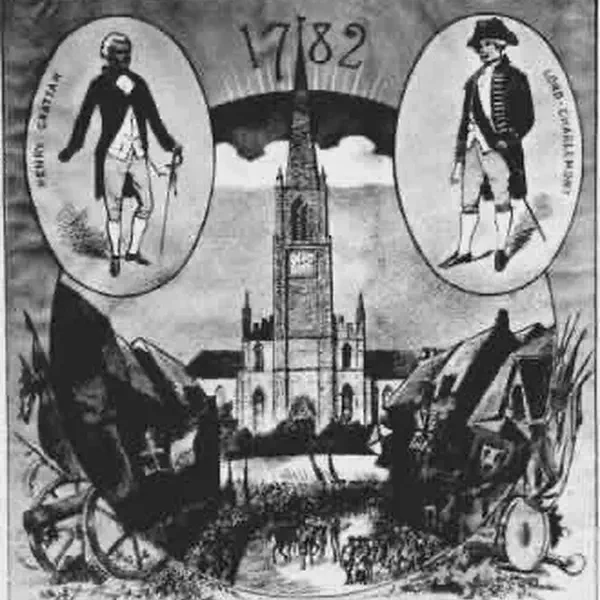
The Volunteers Parliamentary Reform Bill Is Rejected by the Irish House of Commons, 157 to 77
November 19, 1783
The Volunteers (also known as the Irish Volunteers) were local militias raised by local initiative in Ireland in 1778. Their original purpose was to guard against invasion and to preserve law and order at a time when British soldiers were withdrawn from Ireland to fight abroad during the American Revolutionary War and the government failed to organise its own militia.
Taking advantage of Britain’s preoccupation with its rebelling American colonies, the Volunteers were able to pressure Westminster into conceding legislative independence to the Dublin parliament. Members of the Belfast 1st Volunteer Company laid the foundations for the establishment of the United Irishmen organisation.
The majority of Volunteer members however were inclined towards the yeomanry, which fought and helped defeat the United Irishmen in the Irish rebellion of 1798.
The Volunteers were a militia force composed of Protestant volunteers who had organized for the defense of Ireland during a period of uncertainty and perceived vulnerability. The rejection of their reform bill is often associated with the limitations placed on the Volunteers’ political aspirations.
Background: The Volunteers emerged during a time of political tension in Ireland, marked by concerns about the influence of the British government and the desire for greater autonomy.
Parliamentary Reform: The Volunteers became involved in political activism and called for parliamentary reform to address issues such as representation and the influence of the British government in Irish affairs.
The Reform Bill: The Volunteers proposed a parliamentary reform bill that aimed to address perceived deficiencies in the Irish parliamentary system. Their proposals included calls for greater representation and a more equitable distribution of seats.
Rejection: Despite the efforts of the Volunteers and their call for reform, the Irish House of Commons, which was dominated by a conservative Protestant Ascendancy, rejected the Volunteers’ reform bill. The Ascendancy was hesitant to make significant changes that could potentially alter the existing power structure.
Limited Reforms: While the Volunteers were not successful in achieving their broader reform goals, some limited constitutional changes were implemented in subsequent years, including the legislative independence of the Irish Parliament with the passage of the Constitution of 1782.
Impact: The rejection of the Volunteers’ reform bill underscored the challenges and resistance to significant political changes within the existing Irish political establishment. However, it also contributed to a broader movement that eventually led to constitutional reforms and increased Irish legislative independence.
The rejection of the Volunteers’ reform bill is part of the complex political and constitutional history of Ireland during the late 18th century, which laid the groundwork for later developments, including the Act of Union in 1800.